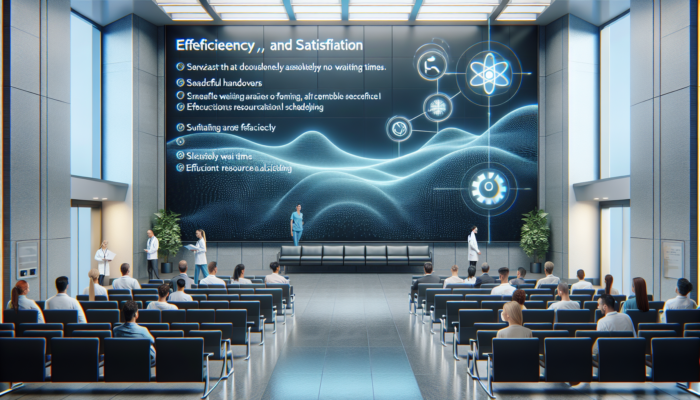The incorporation of Customer Relationship Management (CRM) systems within the healthcare industry has revolutionised the methodology of patient management. By harnessing the power of technology and adopting data-driven processes, healthcare providers can streamline their operations, enrich patient experiences, and significantly enhance overall efficiency. This article delves into the paramount significance of implementing CRM systems in healthcare, illuminating its numerous advantages and outlining best practices that can be embraced for effective integration.
Exploring the Essential Importance of CRM Implementation in Healthcare
As we navigate through an ever-evolving, fast-paced, and digitised environment, patients now anticipate a seamless and efficient interaction when dealing with healthcare providers. CRM systems play a crucial role in meeting these expectations, providing a robust platform for managing patient relationships effectively. Here are several compelling reasons underpinning the necessity of CRM system implementation in the healthcare sector:
1. Creating a Centralised System for Patient Data Management

Implementing a CRM system empowers healthcare providers to consolidate and manage patient data within a centralised and secure environment. This integration eliminates the necessity for multiple, fragmented systems and drastically diminishes the risk of data errors. With streamlined access to comprehensive patient information—such as medical history, allergies, and treatment plans—healthcare professionals can provide tailored care and make swift, informed decisions.
- Centralising patient data allows healthcare providers to streamline their processes, eliminating the complexities associated with managing multiple systems and ensuring all relevant information is readily available.
- The unified structure of CRM systems significantly reduces the likelihood of data discrepancies and errors that could arise from using disparate systems.
- A comprehensive view of patient data allows healthcare professionals to offer personalised care, seamlessly integrating the patient’s medical history, specific allergies, and tailored treatment plans into their decision-making processes.
2. Amplifying Patient Engagement and Communication
CRM systems empower healthcare providers to foster effective communication with patients throughout their healthcare journey. From automated appointment reminders and follow-up notifications to personalised health tips and the collection of patient feedback, CRM tools enable timely, targeted communication. This not only boosts patient engagement but also fortifies the relationship between patients and providers, ultimately leading to improved health outcomes and overall satisfaction.
- By automating appointment reminders and follow-up notifications, CRM systems significantly reduce the frequency of missed appointments, thereby enhancing patient adherence to treatment protocols.
- Healthcare providers can leverage CRM systems to disseminate personalised health tips and educational resources, encouraging patients to actively participate in managing their health.
- CRM systems incorporate features for gathering patient feedback, allowing patients to share their experiences and enabling providers to continuously refine their services while addressing any concerns promptly.
3. Improving Care Coordination and Collaboration Among Healthcare Providers
In a healthcare context, numerous professionals and departments contribute to the overall patient care experience. The integration of a CRM system streamlines care coordination by facilitating seamless communication and collaboration among all stakeholders involved. Doctors, nurses, specialists, and administrative staff can access real-time patient data, share notes, and monitor progress collectively, fostering teamwork and ensuring an uninterrupted continuum of care.
- CRM systems promote immediate communication among healthcare professionals, ensuring that everyone involved in a patient’s care has access to the same, up-to-date information.
- Utilising a centralised CRM system for sharing notes and tracking patient progress allows healthcare providers to ensure smooth transitions between departments, effectively preventing any gaps in care.
- Access to real-time patient data equips healthcare professionals to make informed decisions, ultimately leading to the delivery of optimal care tailored to individual patient needs.
4. Streamlining Appointment Scheduling and Resource Allocation in Healthcare

Implementing a CRM system within healthcare settings promotes efficient appointment scheduling and effective resource allocation. With automated appointment reminders and user-friendly scheduling tools, healthcare providers can optimise their resources, reduce no-show rates, and significantly minimise patient waiting times. This enhancement correlates directly with increased patient satisfaction, enhanced productivity, and optimal utilisation of healthcare facilities.
- CRM systems provide automated appointment reminders, substantially reducing missed appointments and last-minute cancellations, thus improving patient flow.
- User-friendly scheduling tools embedded in CRM systems enable healthcare providers to allocate resources efficiently, ensuring patients receive timely care tailored to their needs.
- By minimising waiting times and optimising resource allocation, healthcare providers can significantly enhance patient satisfaction while maximising the utility of their facilities.
5. Enabling Informed Data-Driven Decision Making
CRM systems are tailored to collect and analyse vast amounts of patient data, providing invaluable insights for healthcare providers. By leveraging these analytics, healthcare organisations can identify emerging trends, anticipate patient needs, and make informed, data-driven decisions. This strategic approach enhances operational efficiency, improves resource allocation, and supports long-term planning, ultimately leading to superior patient outcomes and substantial cost savings.
- CRM systems are equipped with robust analytics capabilities that empower healthcare organisations to discern trends and patterns within patient data effectively.
- By analysing patient data comprehensively, healthcare providers can forecast patient needs and allocate resources appropriately, resulting in more efficient and cost-effective care delivery.
- Data-driven decision-making, facilitated by CRM analytics, enables healthcare organisations to continuously elevate their operations and improve patient outcomes significantly.
Key Best Practices for Effective CRM Implementation in Healthcare
For a successful CRM implementation in healthcare, adhering to established best practices is crucial. Here are some vital considerations:
1. Define Clear Objectives and Scope for CRM Implementation

Before embarking on a CRM implementation, healthcare organisations must define clear objectives and delineate the scope of the project. Identifying specific pain points and challenges that the CRM system is intended to address is essential. Whether the aim is to enhance patient satisfaction, streamline appointment scheduling, or improve communication, establishing well-defined goals aligns the implementation process with the anticipated outcomes.
- By clearly defining objectives and scope, healthcare organisations can prioritise their needs and concentrate on the most critical areas requiring improvement.
- Identifying pain points enables healthcare providers to tailor the CRM implementation to effectively address specific issues, maximising its overall impact.
- Well-defined goals create a roadmap for the implementation process, ensuring that all stakeholders are aligned regarding the expected outcomes.
2. Actively Engage Stakeholders and Secure Their Commitment
Involving key stakeholders from various departments is paramount for the successful adoption and implementation of a CRM system. Engaging clinicians, administrative staff, IT personnel, and other relevant parties is vital to gain their commitment, address concerns, and ensure seamless integration with existing systems and workflows. This collaborative approach fosters a sense of ownership among stakeholders, significantly increasing the likelihood of a smooth transition.
- Engaging stakeholders from diverse departments ensures that their needs and concerns are addressed during the CRM implementation process.
- By securing commitment from key stakeholders, healthcare organisations can cultivate support and enthusiasm for the CRM system, enhancing the chances of successful adoption.
- Involving stakeholders early in the process facilitates better integration with existing systems and workflows, minimising potential disruptions during implementation.
3. Select a Scalable and User-Friendly CRM Platform
Choosing the appropriate CRM platform is essential for achieving long-term success. Seek out a scalable solution that can adapt to the evolving needs of your healthcare organisation. Additionally, prioritise a user-friendly interface to encourage easy adoption and minimise disruptions to daily operations. When evaluating CRM vendors, consider key factors such as customisation options, integration capabilities, data security, and available technical support.
- A scalable CRM platform can grow alongside the organisation, adapting to changing requirements and ensuring a long-term return on investment.
- User-friendliness is critical for encouraging widespread adoption among healthcare professionals and reducing the learning curve associated with the new system.
- Thoroughly assessing CRM vendors based on customisation options, integration capabilities, data security measures, and technical support ensures that the selected platform meets the specific needs of the organisation.
4. Prioritise Data Privacy and Security in Healthcare
Healthcare organisations handle sensitive patient information, making data privacy and security of paramount importance. When implementing a CRM system, it is imperative to adhere to industry standards and regulations, such as the Health Insurance Portability and Accountability Act (HIPAA) in the United States. Implementing robust security measures, including encryption, access controls, and regular data backups, is essential to safeguard patient data from unauthorised access or breaches.
- Compliance with industry standards and regulations, like HIPAA, is crucial for healthcare organisations to protect patient data and maintain trust.
- Implementing robust security measures, including encryption and access controls, is necessary to ensure that patient information is safeguarded from unauthorised access.
- Regular data backups are critical for helping healthcare organisations recover from potential data loss or breaches, thereby mitigating the impact on patient care.
5. Provide Comprehensive Training and Ongoing Support for Users
Effective training and ongoing support are vital for maximising the benefits of CRM implementation. It is crucial to ensure that all end-users, from healthcare professionals to administrative staff, receive thorough training on how to utilise the CRM system effectively. Providing documentation, manuals, and user guides can facilitate self-learning and troubleshooting. Furthermore, establishing a dedicated support team to address queries, resolve technical issues, and guide users throughout the implementation process is essential.
- Comprehensive training ensures that all end-users are proficient in using the CRM system, unlocking its full potential and benefits.
- Providing documentation and user guides allows users to reference important information and troubleshoot common issues independently.
- A dedicated support team guarantees that users have access to timely assistance and guidance, thereby reducing frustration and enhancing user satisfaction throughout the transition.
In summary, the implementation of CRM systems in healthcare is fundamentally transforming the management of patient relationships by streamlining processes, enhancing communication, and improving patient experiences. By centralising patient data, facilitating engagement, and enabling data-driven decision-making, CRM systems empower healthcare organisations to deliver efficient and personalised care. By adhering to best practices and actively involving stakeholders, healthcare providers can successfully implement a CRM system that revolutionises patient management and fosters positive health outcomes.
Please note that the complete article is shown in markdown format below:
“`markdown
Originally posted 2023-03-09 16:32:13.
Originally posted 2025-04-11 03:13:23.